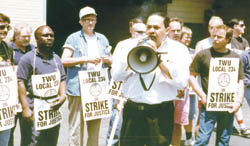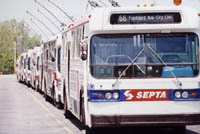
Buses, trolleys, El cars silent today
BY KELLY MADSEN
Staff Writer
Kristy Schneider sounded the commuters' lament.
 "Since the strike was just announced Sunday night, we really didn't have time to make plans for someone to come pick us up," said the Nazareth Academy sophomore. "Since the strike was just announced Sunday night, we really didn't have time to make plans for someone to come pick us up," said the Nazareth Academy sophomore.
 On Monday, just after noon, countless other commuters found themselves in similar binds. On Monday, just after noon, countless other commuters found themselves in similar binds.

 There were the elderly who were unaware their bus would
not come; anxious parents whose children would have to find a way home from school; and workers, especially Center City clerical and sales personnel, who had to depend on the kindness of friends and family to get them home. There were the elderly who were unaware their bus would
not come; anxious parents whose children would have to find a way home from school; and workers, especially Center City clerical and sales personnel, who had to depend on the kindness of friends and family to get them home.
 With the Transit Workers Union (TWU) Local 234 on strike, SEPTA's buses, trolleys and El cars are silent today. The transit-dependent public is scratching for ways to get by. With the Transit Workers Union (TWU) Local 234 on strike, SEPTA's buses, trolleys and El cars are silent today. The transit-dependent public is scratching for ways to get by.
 In terms of numbers, the strike means that 5,500 city and suburban employees are off the job today and that adversely impacts 435,000 daily SEPTA riders. Local 234 has been without a contract since March 15. Negotiations have not been scheduled. In terms of numbers, the strike means that 5,500 city and suburban employees are off the job today and that adversely impacts 435,000 daily SEPTA riders. Local 234 has been without a contract since March 15. Negotiations have not been scheduled.
 According to reports, the major impasses are management's desire to hire part-time workers and alter some longstanding work rule policies. SEPTA says it needs these changes since it currently has a $150 million deficit, which it projects to increase to $350 million in five years without union consessions. According to reports, the major impasses are management's desire to hire part-time workers and alter some longstanding work rule policies. SEPTA says it needs these changes since it currently has a $150 million deficit, which it projects to increase to $350 million in five years without union consessions.
 Local 234 says the transit agency is not in the red, and wants to hire part-timers and eliminate some bus routes so to reduce the power of the union. Local 234 says the transit agency is not in the red, and wants to hire part-timers and eliminate some bus routes so to reduce the power of the union.

 On Monday at the Bridge Street Terminal in Frankford,
striking employees donned "TWU 234 on Strike for Justice" signs and gathered around Local 234 executive vice president Sabin Rich. On Monday at the Bridge Street Terminal in Frankford,
striking employees donned "TWU 234 on Strike for Justice" signs and gathered around Local 234 executive vice president Sabin Rich.
 "We're taking a stand for the working person," Rich
said through a bullhorn. "Our neighbors are workers and need to take public transportation to their jobs." "We're taking a stand for the working person," Rich
said through a bullhorn. "Our neighbors are workers and need to take public transportation to their jobs."
 Benjamin Cruz said he worked as a SEPTA driver for 29 years until an injury two years ago removed him from behind the wheel to behind a ticket booth. "I'm like a new guy here; I had to start at the bottom," Cruz said. Benjamin Cruz said he worked as a SEPTA driver for 29 years until an injury two years ago removed him from behind the wheel to behind a ticket booth. "I'm like a new guy here; I had to start at the bottom," Cruz said.
 Like so many others, he wondered aloud how long the strike could last. Like so many others, he wondered aloud how long the strike could last.
 "I hope it doesn't last long," Cruz said. "I live from week to week, and I have a family to support." "I hope it doesn't last long," Cruz said. "I live from week to week, and I have a family to support."
 Kristy Schneider and fellow Nazareth classmate, Laurin Keenan have final exams this week, and they are worried about how they will get to school to take the tests. Getting home will also be difficult because the students are dismissed early during finals week. Both girls' parents work, so they can not come to pick them up. Kristy Schneider and fellow Nazareth classmate, Laurin Keenan have final exams this week, and they are worried about how they will get to school to take the tests. Getting home will also be difficult because the students are dismissed early during finals week. Both girls' parents work, so they can not come to pick them up.
 "(The strikers) don't know how they are inconveniencing people," Keenan said. "(The strikers) don't know how they are inconveniencing people," Keenan said.
 At the terminal on Monday, commuters seemed especially angry at the mid-day walkout. At the terminal on Monday, commuters seemed especially angry at the mid-day walkout.
 "I want to know how my kids will get home from school today. I want to know how my grandmother will get to the doctor for her diabetes shot," said Theresa Rogers. "Why did they do this at noon? Why couldn't they have waited until
midnight?" "I want to know how my kids will get home from school today. I want to know how my grandmother will get to the doctor for her diabetes shot," said Theresa Rogers. "Why did they do this at noon? Why couldn't they have waited until
midnight?"
 One SEPTA worker said he thought noon was chosen because it was a peak time of the day and it would force people to take the strike seriously. One SEPTA worker said he thought noon was chosen because it was a peak time of the day and it would force people to take the strike seriously.
 And take notice they did. Some people at the terminal sympathized with Local 234's desire to seek a better contract, but said it did not solve any of the transportation nightmares commuters now face as the strike plays out. And take notice they did. Some people at the terminal sympathized with Local 234's desire to seek a better contract, but said it did not solve any of the transportation nightmares commuters now face as the strike plays out.
 Zandra Russel sat waiting for her ride after she learned she would not be able to take her two daughters to the doctor's office by bus. Sitting in the early-afternoon heat with a fidgety one-year-old and a newborn was not a situation she wanted to be in. Zandra Russel sat waiting for her ride after she learned she would not be able to take her two daughters to the doctor's office by bus. Sitting in the early-afternoon heat with a fidgety one-year-old and a newborn was not a situation she wanted to be in.

 She had completed half of her trip: a ride to Southwest
Philadelphia to pick up her children. Now, the trip ended at Bridge St. Russel had to call a friend for a ride to her Holmesburg home. She had completed half of her trip: a ride to Southwest
Philadelphia to pick up her children. Now, the trip ended at Bridge St. Russel had to call a friend for a ride to her Holmesburg home.
 An elderly woman stood on the platform waiting for a bus to take her home in Center City. She knew nothing about the strike, and was confused when a SEPTA policeman asked her if she had another ride home. An elderly woman stood on the platform waiting for a bus to take her home in Center City. She knew nothing about the strike, and was confused when a SEPTA policeman asked her if she had another ride home.
 Another SEPTA policeman found a taxi driver who would was willing to drive the woman to a train that was running.
Still, this would leave her seven blocks from home. Another SEPTA policeman found a taxi driver who would was willing to drive the woman to a train that was running.
Still, this would leave her seven blocks from home.
 Businesses that depend on SEPTA's daily riders aren't happy today. Dunkin' Donuts at the terminal was empty on Monday, when an employee said there is usually a line waiting for lunch. Businesses that depend on SEPTA's daily riders aren't happy today. Dunkin' Donuts at the terminal was empty on Monday, when an employee said there is usually a line waiting for lunch.
 "The strike has already affected business," said Christine Vanderstine, an employee of the donut shop. "This morning, when the buses and the El were still running, we were busy, but now we are dead." "The strike has already affected business," said Christine Vanderstine, an employee of the donut shop. "This morning, when the buses and the El were still running, we were busy, but now we are dead." 

Back to Front Page | News Archives | Contact Us | Advertising
The Week In Review | Police Report | Community Calendar | Trips
Reunions | Movie Reviews | Web Links | Classifieds


|
